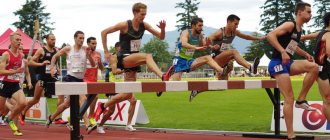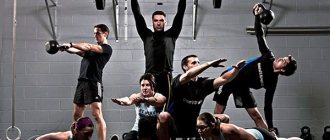An orthopedic traumatologist and a running coach answer.
This question is discussed in the sports community with the same consistency as, for example, “dogs or cats” among pet lovers or “Apple or Android” among gadget lovers. Scientists decided to clarify and came to the conclusion that training should be completed no later than two hours before bedtime. Is this really true?
Sergey Aleksutov
traumatologist-orthopedist, chief podiatrist of the First professional network of orthopedic salons ORTEKA
The choice of time for training directly depends on your daily routine and lifestyle.
Photo: istockphoto.com
Arguments for"
The benefits of exercising, including in the evening, are obvious:
- The body becomes more energetic.
- The slow phase of sleep increases, during which a person has time to regain strength.
- Over time, waking up becomes easier.
- During evening classes, the body “resets” negative energy associated with stress and psycho-emotional disorders.
That is, training before bed provides pleasant relaxation: the body gets tired, so at night a person goes to sleep faster and feels refreshed the next morning. However, this rule only works if you exercise 3-4 hours before falling asleep, and not a few minutes.
When is the best time to exercise?
Depending on your motivation, the best time to exercise varies slightly. First of all, it should be noted that body temperature changes depending on the time of day. The lowest body temperature is set in the period from one to three hours before waking up in the morning. The highest temperatures are observed in the late afternoon, around 17:00. It has been proven that the higher the body temperature, the better our physical capabilities. Based on this, we can assume that the most suitable time for training is in the late afternoon .
Arguments against"
If you exercise before bed, it also has its downsides:
- By the evening, a person is tired after a working day, his physical and emotional strength is already running out. Heavy loads and intense training will be inappropriate. As a result, a person immediately wants to sleep after training, which can lead to disruption of the natural biological rhythm.
- A disorder in the internal clock leads to the fact that the student may fall asleep after classes, and also often wants to sleep during the day.
- In the evening hours and at night, metabolic processes begin to decrease, and if you play sports, they, on the contrary, become more active.
- As a result, the person begins to produce the appropriate hormones, which cause the effect of wakefulness, as if it were morning. Therefore, falling asleep after intense exercise in the evening, even 3 hours before going to bed, is problematic. Poor sleep after exercise is observed especially often in people who are accustomed to falling asleep and waking up early, the so-called “larks.”
- Another argument against is the peculiarities of building muscle mass. If you exercise in the first half of the day, muscle growth processes occur faster. By the evening they have time to rest, which ensures recovery.
If you have developed a habit of exercising in the evening, and there are no problems with sleep, you can continue to go to the gym at a convenient time. However, if fatigue or sleep disturbances occur, you cannot continue exercising as before: strength exercises are postponed to the next morning so that you can get a normal night's sleep.
The body's response to training
In addition to the stimulating effect on the psyche, training has a complex effect on the body:
- Increases heart rate and breathing
- Blood pressure rises
- Body temperature rises and sweating increases
- The hormonal system is actively involved in its work
In response to training load, stress hormones are released into the blood - adrenaline, norepinephrine, cortisol. There is a powerful release of the anabolic hormone testosterone and the hormone of happiness - endorphin.
At the end of a workout, the body cannot immediately switch to sleep mode. He needs time to normalize this “hormonal cocktail”.
To help your body come to a state of rest faster, be sure to do a cool-down!
This could be a swimming pool, stretching or breathing exercises. Also be sure to take a warm shower for extra relaxation.
The main task after training is to slow down the heart rate and bring the central nervous system to its normal state.
Following these simple rules will significantly speed up the process of returning all body functions to normal.
Optimal time for sports activities
Many scientific studies have been and are being conducted regarding the selection of the optimal time for physical education, fitness and professional sports. They showed that the approach must take into account three factors at once:
- load intensity;
- individual characteristics of the body;
- purpose of the lesson.
For each person, the norms of physical activity and sleep duration are individual. Some people exercise in the morning, which makes them feel more energetic, while others do it in the evening. However, in any case, you need to understand:
- In the evening hours, it is harmful to engage in weightlifting and other sports that put a lot of stress on the body.
- Since it is undesirable to exercise before bed, after evening exercise you should do a set of relaxing exercises: walking, yoga, light jogging, stretching, free swimming in the pool, etc.
- In the morning, they do useful exercises that help invigorate the body. Therefore, doing gymnastics after waking up is normal, but without heavy loads.
Running and athletics
Running exercises in the morning, exercises and other exercises that do not overload the body have an invigorating effect. A light jog combined with warm-up movements and pull-ups on the horizontal bar is allowed both in the morning and in the evening. It is appropriate to pump up your abs, do push-ups and do other similar exercises. It is useful to pay attention to the following tips:
- It is harmful to run immediately after waking up, because... the body should adjust within 30-40 minutes.
- in the first half of the day the time is from 6 to 7 and from 11 to 12 o'clock. The main goal of running is to awaken and energize the body.
- In the evening they run from 19 to 20 hours. Exercise allows you to relieve stress, tension from the day and burn calories.
At the same time, it is not recommended to engage in running sports too late (after 20 hours), since due to the increased load, the body does not have time to fully rest and get ready for sleep.
Another important topic relates to whether it is possible to train at night. There are several different, including opposing, answers. However, it is important to understand that at night the natural human biorhythm prepares the body for sleep. Therefore, constantly exercising at night is a bad decision.
Power training
The situation is similar with strength training (weightlifting, bodybuilding, etc.). Since such sports involve a heavy load on the body, exercise in the evening or especially before bedtime has a harmful effect in terms of falling asleep.
Another negative aspect of evening training is that at this time fat is burned ineffectively, and weight loss will be minimal. The reason is that food comes in during lunch and sugar is burned only after 4-5 hours. Therefore, the body first spends it and then extracts energy from its own fat reserves.
Yoga
Doing gentle exercise before bed is beneficial because it gives your body time to relax and become tired, making it easier to fall asleep. Light bends forward, twisting, longitudinal bends and other types of movements help relieve fatigue from the spine and muscles of the body. It is optimal to do them an hour before going to bed.
Cardio exercises
Cardio training involves intense aerobic exercise that strengthens the heart muscle and activates metabolic processes. The corresponding chemical reactions begin approximately 40-50 minutes after the start of the workout, so cardio takes an hour or more. During classes, they especially carefully monitor the pulse, the value of which is used to determine the calories burned.
The optimal time for classes is the morning (from 6 to 11). The body burns fats because the new food has not yet arrived in large quantities (before lunch). The heart muscle is also strengthened (due to moderate exercise). If you exercise in the evening, and especially before bedtime (after 20-21 hours), an influx of vivacity occurs, and it becomes difficult to fall asleep.
What the latest research says
Before writing, I additionally studied more recent research that was conducted in 2022. One of them is called “Effects of Evening Exercise on Sleep in Healthy Participants.” Authors: Jan Stutz, Christina Spengler and Remo Eicholzer. The purpose of this study is to study the effect of intensity and duration of training on the human body, to analyze the rate of sleep onset and human behavior during night rest.
Much data analysis was carried out. The final conclusion of this study was confirmation that activity before bedtime reduces the quality of night rest and slows down the onset of sleep. If training is carried out 1 hour before bedtime, then in this case the human body is not ready to relax before a night's rest. The influx of energy caused by the acceleration of the pulse and increased muscle tone brings the body into an active and excited state. And this makes it difficult to relax and calm down before bed.
TOP 5 tips for proper nutrition before bed
The beneficial effect of training is neutralized if a person eats incorrectly. Here are 5 simple tips for those who play sports to remember:
- It is allowed to eat foods high in protein - dietary meat of boiled chicken, turkey, veal, as well as seafood.
- Dairy products – low-fat kefir, cottage cheese, yogurt and cheeses – strengthen bones and muscles.
- Among the drinks, weak herbal teas (preferably green) are suitable.
- It is undesirable to consume any sweets and any fatty foods.
- Among the drinks prohibited are coffee, black tea, cocoa, and alcohol.
In this case, you should remember the general rule: eating is not advisable 4 hours before going to bed. The digestive system must have time to absorb the incoming food, otherwise at night the stomach and intestines will not be able to fully recover.
Five recommended exercises before bed
Relaxing exercise can be part of your pre-bed ritual. To practice with pleasure, they develop their own complex, taking into account possible contraindications. You can take the following types of exercises as a basis (they are performed on the floor, on a mat):
- Lie on your back, bend your knees at a right angle and bring them so as to touch your chest closely. Hands reach to the toes to feel pleasant relaxation.
- Continuing to lie on your back, place your feet firmly on the floor; arms lie along the body. The pelvis is gradually raised above the surface, pulled as high as possible, held in this position and returned.
- Sit in the lotus position on a small pillow. The knees diverge as wide as possible. Place your right hand on the floor, bend to the right, and take your left hand as high as possible. Then repeat on the other side.
- Continuing to sit in the lotus position, make turns left and right. The movements are slow, as if the person wants to see an object behind.
- Stand on the mat, slightly bend your knees and group yourself, pressing your chest to your legs as much as possible. Hands hug each other. At the same time, you should not strain your abdominal or chest muscles.
Thus, the question of whether it is possible to exercise before bed has a negative answer in the sense that intense, heavy exercise with high loads does more harm than good. A light jog or yoga helps you relax and fall asleep easily. Since each organism has its own biorhythm, you should be guided by both general rules and your own feelings.











